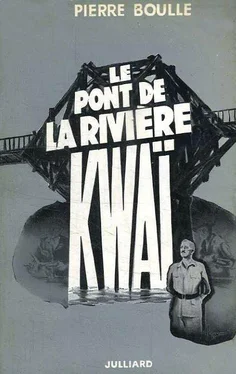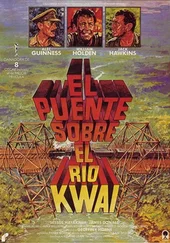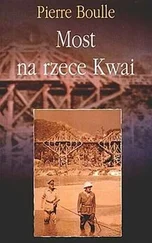The ghost of a suspicion flashed through his mind, but the truth was too extraordinary for him to grasp immediately. Yet he was no longer in a cheerful mood. His morning was spoiled. He turned around again to have another look at the anomaly, found no explanation, and finally stepped off the bridge, still feeling rather puzzled.
“It can’t be true,” he muttered, as he contemplated the vague suspicion skimming through his brain. “Unless it’s one of those Chinese Communist bands…”
Sabotage was firmly associated in his mind with gangster activity.
“It can’t be true,” he repeated, still unable to recapture his light-hearted mood.
The train was now in sight, though still some way off, struggling up the line. The Colonel calculated that it would take at least ten minutes to arrive. Saito, who was strolling up and down between the bridge and the company, watched him approach and felt embarrassed, as he always did in the Englishman’s presence. Colonel Nicholson suddenly made up his mind as he drew level with the Japanese.
“Colonel Saito,” he declared in a lordly manner, “there’s something rather odd going on. We’d better look into it more closely before the train goes across.”
Without waiting for an answer, he scrambled quickly down the slope. His intention was to take the small native canoe moored under the bridge and make a tour of inspection around the piles. As he reached the beach he instinctively swept it with his trained glance and noticed the length of electric wire on the shining pebbles. Colonel Nicholson frowned and walked over toward it.
It was while he was scrambling down the slope, with an ease born of the daily habit of light exercise and the peaceful contemplation of everyday truths, that he came into Shears’s field of view. The Japanese colonel followed close behind him. It was only then that Shears realized that adversity still had a card up its sleeve. Joyce had been aware of this for some time. In the state of trance to which he had managed to force himself he had seen the Colonel’s behavior on the bridge without any further feeling of alarm. But he seized his dagger as soon as he saw the figure of Saito following behind him on the beach.
Shears noticed that as Colonel Nicholson approached he seemed to be dragging the Japanese officer along in his wake. In face of this incoherent situation he felt himself give way to a sort of hysteria; he began babbling to himself:
“But the other fellow’s leading him to it! It’s our own colonel who’s taking him there! If only I could explain, have a word with him, just a word!”
The sound of the puffing engine could be heard in the distance. All the Japanese were probably now on parade, ready to present arms. The two men on the beach were invisible from the camp. Number One made an angry gesture as he instantly grasped the whole situation and instinctively realized what action would have to be taken, the action | which a situation of this sort required and demanded of every man who had enlisted in the ranks of the Plastic and Destructions Company. He, too, seized his knife. He tore it out of his belt and held it in front of him according to the school training, palm downward, the nails underneath, the thumb running along the back of the blade— not in order to use it, but in the wild hope that he would be able to influence Joyce by suggestion, and moved by the same instinct which had induced him a little earlier to follow the movements of the patrol.
Colonel Nicholson had stopped in front of the wire. Saito was coming up behind him, waddling along on his stumpy legs. All the emotions that Shears had felt in the morning were nothing to what he felt at that moment. He began talking out loud, brandishing the dagger in front of him above his head.
“He won’t be able to do it! There’s a limit to what you can expect of a lad of that age who’s been brought up in the ordinary way and spent his whole life in an office. I was made to let him have his way. It was up to me to take his place. He won’t be able to do it!”
Saito had caught up with Colonel Nicholson, who had bent down and picked up the wire. Shears felt his heart thumping against his ribs.
“He won’t be able to do it! Three minutes more, just three minutes, and the train will be here. He won’t be able to do it!”
One of the Siamese partisans crouching by his rifle gazed at him in terror. Luckily the jungle muffled the sound of his voice. He was hunched up, clenching his fist around the knife which he held motionless in front of him.
“He won’t be able to do it! God Almighty, make him lose his head; make him fighting mad—just for ten seconds!”
As he uttered this wild prayer, he noticed a movement in the undergrowth, and the bushes parted. He stiffened and held his breath. Joyce was silently creeping down the slope, bent double, with his knife in his hand. Shears fastened his eyes on him, and kept them there.
Saito, whose mind worked slowly, was crouching at the water’s edge with his back to the forest, in the Oriental’s favorite position which he instinctively adopted whenever any unforeseen event made him forget to guard himself against it. He, too, had picked up the wire. Shears heard a few words spoken in English:
“This is really rather alarming, Colonel Saito.”
After that there was a short silence. The Jap was pulling the strands apart in his fingers. Joyce had arrived unobserved behind the two men.
“My God,” the Colonel suddenly yelled, “the bridge has been mined, Colonel Saito. Those damn things I saw against the piles were explosives! And this wire…”
He had turned around toward the jungle, while Saito let the weight of these words sink in. Shears watched still more intently. As his fist flashed across from right to left, he saw an answering flash on the opposite bank. He at once recognized the familiar change that had come over the man crouching there.
So he had been able to do it! He had done it. Not a muscle in his tensed body had faltered while the steel went in with hardly any resistance. He had gone through the subsidiary gestures without a tremor. And at that very moment, partly in order to obey the instructions he had received and partly because he felt the overwhelming need to cling to something human, he had brought his left fist down onto the neck of the enemy whose throat he had just slit. In his death spasm Saito had begun to straighten his legs and was in a semi-upright position. Joyce had clasped him with all his strength against his own body, partly to stifle him and partly to still the trembling which had started in his own legs.
The Jap had collapsed. He had not uttered a sound, apart from the death rattle, which Shears only heard because he was expecting it. For a few seconds Joyce lay paralyzed underneath his adversary, who had fallen on top of him and was drenching him with his blood. He had had the strength to win the first round. Now he was not sure that he had enough will power to struggle free. At last he gave a heave. In a single movement he threw off the lifeless body, which rolled half into the water, then looked around.
Both banks were deserted. He had won, but his pride could not dispel either his horror or disgust. With an effort he got up onto his hands and knees. There were still a few simple things he had to do. First of all, explain himself. Two words would be enough. Colonel Nicholson had remained rooted to the spot, petrified by the suddenness of the scene he had witnessed.
“Officer! British officer, sir?” Joyce muttered. “The bridge is going up. Stand clear!”
He could not recognize his own voice. The effort of moving his lips caused him untold labor. Yet this fellow here did not even seem to hear him!
“British officer, sir!” he repeated in despair. “Force 316 from Calcutta. Commandos. Orders to blow up the bridge.”
Читать дальше











